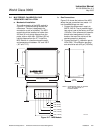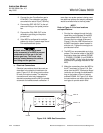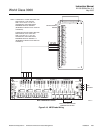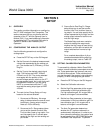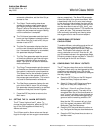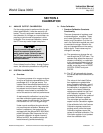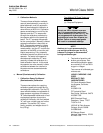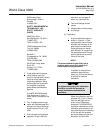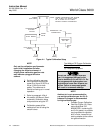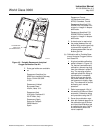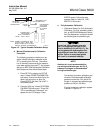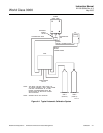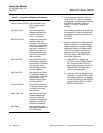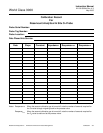
Instruction Manual
IB-106-300NH Rev. 4.3
May 2005
Rosemount Analytical Inc. A Division of Emerson Process Management Calibration 4-3
World Class 3000
255 Brimley Road
Scarborough, Ontario,
Canada
416/266-3161
SCOTT ENVIRONMENTAL
TECHNOLOGY, INC.
SCOTT SPECIALTY
GASES
2600 Cajon Blvd.
San Bernardino, CA 92411
714/887-2571
TWX: 910-390-1159
1290 Combermere Street
Troy, MI 48084
314/589-2950
Route 611
Plumsteadville, PA 18949
215/766-8861
TWX: 510-665-9344
2616 South Loop, West
Suite 100
Houston, TX 77054
713/669-0469
2 If gas bottles will be perma-
nently hooked up to the
probe, a manual block valve is
required at the probe (be-
tween the calibration fitting
and the gas line) to prevent
the migration of process
gases down the calibration
gas line.
If an MPS 3000 Multiprobe
Gas Sequencer is used, a
check valve is required at the
probe.
3 Two, 2-stage pressure regu-
lators with stainless steel dia-
phragms for tanks. Maximum
output required: 20 psi (138
kPa).
4 One instrument air pressure
regulator: 20 psi (138 kPa)
maximum and a supply of
clean, dry instrument air.
5 Two zero-leakage shutoff
valves.
6 Miscellaneous oil-free tubing
and fittings.
(b) Calibration
1 A typical calibration setup is
shown in Figure 4-1. Care
must be taken that all fittings
are tight and free from oil or
other organic contaminants.
Small openings can cause
back diffusion of oxygen from
the atmosphere even though
positive pressures are main-
tained in the lines.
NOTE
The probe calibration gas fitting has a
seal cap which must be in place at all
times except during calibration.
In addition to the precision
calibration gas mixtures,
clean, dry, oil-free instrument
air should be used for
calibration.
For optimum accuracy, this calibration
should be run with the process at
normal temperature and operating
conditions.
When the calibration gas line
exceeds 6 ft (1.8 m) in length
from the leak tight valves,
check valve, Rosemount
Analytical P/N 6292A97H02,
should be installed next to the
calibration gas connection on
the probe to prevent breathing
of the line with the process
gas and subsequent gas con-
densation and corrosion.



